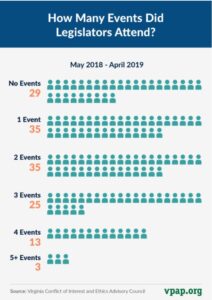
By Steve Haner
‘Our friends at the Virginia Public Access Project are a bit later this year with their data and visuals on Virginia’s embarrassingly weak and intentionally vague lobbyist entertainment reporting. It is still nothing but a sham, exactly how the legislators and lobbyists want it.
The 2018 VPAP coverage was subject of a May 2018 Bacon’s Rebellion report, but this time we are five weeks away from tight elections in both bodies. Voters are not short of things to get outraged about, but we can add this to the list.
The basic 2019 report is little changed from VPAP’s 2018 data. Last year 109 of the 140 legislators admitted accepting at least one entertainment event, and this year it appears 111 did. The number who report accepting five or more has dropped. The key word in that sentence is “reporting”.
UPDATE: VPAP has now added this year’s graphic on the high number of lobbyist disclosures that simply ignore the directive to be specific about the “matters” that get their attention. A few well placed $100 fines and red faces would fix that, but of course, the point is to PRETEND to disclose….
It remains possible and quite common practice under Virginia law (described here) to avoid reporting requirements, and there were probably hundreds of times annually when one or more lobbyists picked up the bar tab and dinner bill after a long discussion on issues, with no requirement to report. The bill is split between two or more of the hosts, or two or more of that host’s clients, and voila, the cost per guest falls below the $50 reporting threshold.
Use the calendar of events provided by VPAP and find plenty of such instances. Pick a few dates on your own and see. Look for events with the same cost at the same venue. You’ll also see plenty of events where the bill simply stayed below $50 per attendee (who had the house salad and who had steak and three drinks, you’ll never know.)
There is another wrinkle worth discussing, although David Poole at VPAP says it is not new with this report: The total cost of several major entertainment events has been adjusted, lowering it on these reports. State law is clear and has been reinforced by an Ethics Council ruling that the total cost of any event attended by a legislator or other reportable official needs to be reported.
If this is a dinner with ten members of an association and three legislators, the rule makes sense. If the event is the christening of an aircraft carrier, with ten state officials and spouses among a crowd of five thousand, the requirement is nothing short of stupid. Should you list the total cost of a Redskins game because a legislator sits in your company box? No, just report the value of the seat, food and drink.
But if the event is some association’s annual legislative reception, such as the well-attended Agribusiness Council dinner, and the event exists entirely to wine, dine and lobby state officials, every dollar is a lobbying entertainment expense. If a member from another part of the state is there, he or she came to be with legislators. VPAP, which always remember is largely run by the lobbyists for the lobbyists, makes these adjustments on its own terms, using only the per person cost of the state officials. For example, only $4,800 of the Agribusiness dinner’s total cost now shows up.
Poole says it is not new practice but said VPAP has gone back several prior years and made this adjustment retroactively. Advocating to fix the law is not in VPAP’s brief, but “adjusting” officially reported data is now? The adjusted amounts are marked and there is a long rationale provided, too long to reproduce here.
The focus on event cost, however, is a distraction from the real issue – the failure to list the names of state officials or their family members being entertained unless that $50 per capita per payer threshold is hit. Most such events are missing from VPAP or from the official reports. The threshold is the first element of deception. The ability of lobbyists to split the bill is the second element of deception. They simply do not want us to know.
What I wrote earlier this year is still valid: A discussion over coffee, lunch or even dinner in and of itself corrupts nobody. But lobbyists or private citizens who can afford to do it, and get their invitations accepted, enjoy an advantage over lobbyists or private citizens who cannot afford it or find the practice distasteful. Such activities should be reported in full.

Leave a Reply
You must be logged in to post a comment.